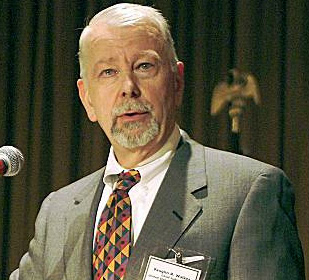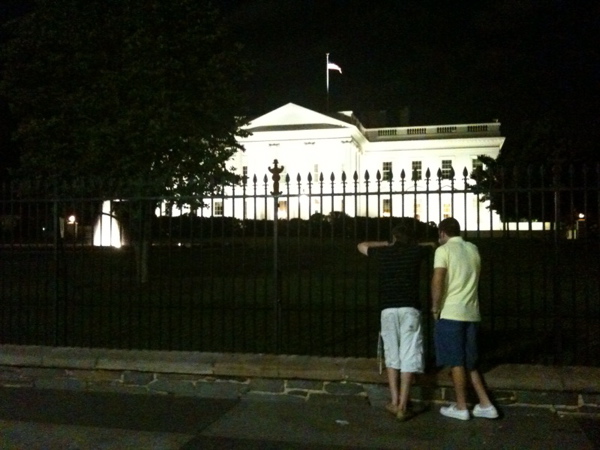Back at the old Law Dork blog, before I worked for the State of Ohio, before I stopped working for the State, before I moved back to D.C., before we were remembering — as we are today — that awful day nine years ago, I posted the following on September 11, 2006:
TITLE: Remembering
DATE: 09/11/2006 11:19:15 PM
Five years ago, I was working for the Tribune Chronicle in Warren, Ohio. Right about now, I was helping finish up the first zone of the Sept. 12 edition, after having been at work since 10 in the morning.
On Sept. 18, 2001, I wrote about that day. Though it was missing the perception and perspective that time provides, it remains my most vivid, and somber, memory of that day.
* * * * *
The Longest Day
I was up late Monday night (actually, early Tuesday morning), returning to my apartment — like most other nights — from putting out the paper. Being a copy editor at a morning newspaper gives me a somewhat nocturnal existence.
Tuesday was Election Day for voters in Massachusetts and New York City, and I had something to say about it. So — like many other nights — I wrote. Nothing special. In fact, most of it was pretty bad. But I wrote until the last moments of night, going to bed a little before 7 a.m. Tuesday. No need to wake before work that day, I figured I could sleep until 2 or 3 in the afternoon.
My sleep was cut short.
The phone rang.
Not even looking at the clock, I ignored the call, knowing it was some telemarketer I had no desire to speak with.
Then my cell phone rang.
My best friend.
It was 8:58 a.m.
“Turn on the TV.”
“What?”
“Now.”
MSNBC — the channel on when I had turned the TV off the night before — gave me my first view of the horror. For all my life, I will never forget the image so many of us saw that morning.
I also will never forget my half-asleep reaction from the relative safety of my Ohio home. The voice that came from my mouth was one I have never heard before — and hope to never hear again.
“Oh my God. Oh my God!”
Within moments, I was called into work.
I called my mother on the way there. I checked in with her and then called my friend again. The drive to the newspaper had me listening to the radio and my friend from Washington, D.C., report about smoke rising from behind the Old Executive Office Building — the earliest mentions of what soon turned out to be the flight hitting the Pentagon.
* * *
About 9:30 a.m., I arrived at the newspaper.
A special edition was to be put out by noon, and with the news changing by the minute, the task was not a simple one.
In addition, I had to make a decision that taught me more about journalism than any class or experience before Tuesday had ever suggested.
I could not feel.
I could not let the event hit me — in any true, emotional way — until after I was done for the day.
As we prepared the special edition, I did just that. I didn’t think anything other than checking the Associated Press for the latest updates, reading and editing local coverage, writing headlines and laying out pages.
There was the “buzz of the newsroom” I had loved since my first day at the paper.
I never would have guessed how empty and horrid that buzz could be.
As we went through the motions, as the terror became clear, as the towers crashed and the rumors swirled, our reality was singular. Our responsibility was awesome — yet depressing.
We were pressed against the glass — looking through the window for the community — hoping to accurately and objectively portray the day’s events, a simple phrase that took on a whole new meaning Sept. 11.
Regardless of how tight we pressed against the glass, we also were powerless.
We were not the doctors, police or firefighters rushing to the scene. We were not the local ambulance company hurrying to help. We were removed — and yet in the middle of it all.
After we finished the special edition, we at the copy desk were able to slow down for a few hours before beginning the next day’s paper.
* * *
Occasionally contributing to the editorial page, I sat with some of the editorial board as we discussed the next day’s editorial.
“Flatten Afghanistan — just go in and flatten it,” said one particularly ready-to-strike and half-serious editor.
I was disturbed, but not sure how I could speak — at my age — about an event with which I had little or no benchmark for comparison.
I remembered getting videotapes and recording the CNN coverage of the Gulf War as I attended middle school. I knew nothing then — and I knew less now.
All of a sudden my earlier dismissals of international politics and foreign nations were worse than simple-minded — they were arrogant, they were wrong, they were dumb.
With the surety only naivete can provide, I spoke.
“We can’t do that. They are just as innocent as the people in the towers.”
The discussion continued and my mind reeled:
What would it mean?
Was this war?
The hawk editor said it was war; I countered that it was an “act of war,” a distinction I desperately clung to in my 23-year-old mind.
As we talked, an editorial position became clear — and was echoed by many papers and the Bush administration in the next days.
I wasn’t willing to give up Afghanistan so easily, and other editors filed closer to me than to the hawk. We settled on those countries “who supported these terrorists or aided in the attacks.” I thought I was satisfied, but I wasn’t sure.
I wasn’t sure of anything.
* * *
Some lunch and down time later, the evening began.
The stories kept coming; the horrors kept building; the fears kept growing.
Being a rather cynical staff, we wanted to see Bush. Hell, we wanted to see Cheney. I think we all wanted to see anything resembling what has now become either “normalcy” or “life before Tuesday.”
As the paper came together and the images were placed with the stories, the “big picture” started to form.
A man falling — diving — from one of the towers.
The fire, blood, smoke and darkness of “ground zero.”
The Pentagon — which I had always seen as our military’s central fortress — becoming a misnomer, with fire trucks aiming their hoses at its missing side.
As the night came to a close, the last few of us sat watching the TVs, looking to find something — what it was, I am not sure.
Maybe some were looking for a way to avoid facing the reality.
Maybe some were trying to find some meaning.
Maybe some were hoping a counterattack quickly would be under way.
Maybe we just didn’t know what else to do.
* * *
Finally, about 2 a.m., I headed for home. I drove that drive I have driven five nights a week for the past year and a half thinking about everything and nothing at all. More than once tears started to well up.
I started thinking about people. Earlier in the night, I had read of Barbara Olsen’s death. The wife of the nation’s Solicitor General, I often had shouted obscenities her way as I watched her on Chris Mathews’ “Hardball.”
She called her husband before she died — from the plane. I had read it, and now I could get nothing else in my mind.
But then there was something else.
My friends.
I had talked to or gotten e-mails from nearly all my close friends in D.C. And to my knowledge, I knew no one who worked in or with the Pentagon in any way.
In New York, I knew one friend was OK. After returning home and checking my e-mail, I knew another was shaken, but fine physically. One other friend had not e-mailed — and despite wanting to hope for the best, I considered the worst.
As I read Wednesday’s online versions of The Washington Post and The New York Times, it hit.
It was 3:30 a.m.
I was not a journalist now.
I started crying.
I hurt. I had no concept of what had happened — and yet I felt it all hitting me at once.
The morning a distant memory, I called the friend who had woken me to this terror nineteen hours ago.
I cried; he comforted.
Then we talked of our fears of the day, our fears of tomorrow, anything to keep the voices going.
Eventually, we hung up, ending a long call on the longest day either of us have ever known.
I went to sleep.
Like a reverse nightmare, I hoped when my eyes shut that the terror would disintegrate.
It didn’t.
It won’t.
Popularity: 7% [?]








